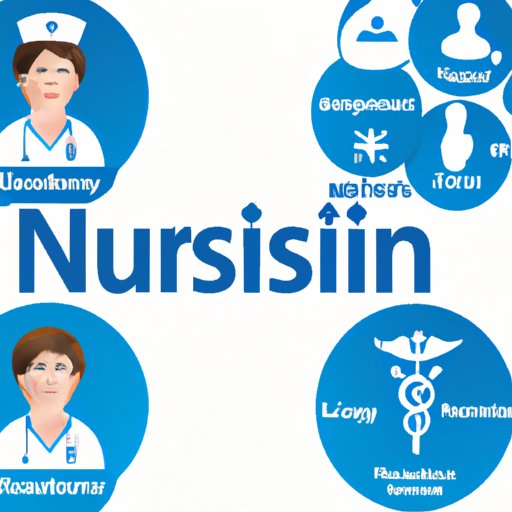Introduction
Nursing leadership is an essential component of the healthcare system. It is defined as the practice of leading and managing nursing teams in order to provide quality care to patients. The purpose of this article is to explore why nursing leadership is important and examine the role of nurse leaders in improving patient outcomes.
Highlighting the Unique Skills that Nurses Bring to the Table
The nursing profession has long been recognized as one of the most important roles in the healthcare system. Nurses are highly skilled professionals who provide compassionate, evidence-based care to patients and their families. They possess a unique set of skills that make them well-suited for leadership roles, including strong communication skills, problem-solving abilities, and the ability to manage complex situations.

Exploring the Benefits of Having a Nurse Leader in Healthcare Organizations
Having a nurse leader in a healthcare organization can bring many benefits, including improved patient outcomes, increased staff satisfaction, and more efficient operations. Nurse leaders have a deep understanding of the nursing profession and are able to provide support and guidance to other nurses. This can lead to better patient care, as nurses are able to focus on providing high-quality care instead of worrying about administrative tasks. Additionally, nurse leaders can create a positive work environment, which leads to increased job satisfaction among staff members.
Nurse leaders are also well-equipped to manage the complexities of the healthcare system. They understand the nuances of the system and can create more efficient processes and operations, which can lead to cost savings and improved patient outcomes. Furthermore, nurse leaders can identify areas where improvements can be made and develop strategies for implementing those changes.

Examining the Increasing Complexity of the Healthcare System and How Nurse Leaders Can Help Navigate It
The healthcare system is becoming increasingly complex, with rising costs, changing regulations, and new technologies. This complexity can pose a challenge for healthcare organizations, but nurse leaders can help navigate it. Nurse leaders have the knowledge and experience to understand the intricacies of the system and develop strategies for dealing with it. They can also identify areas of improvement and create plans for implementing those changes.
Nurse leaders can also help ensure that healthcare organizations comply with regulations and adhere to industry standards. They can help create policies and procedures that promote patient safety and quality care. Additionally, they can help foster collaboration between different departments and organizations, which can lead to improved patient outcomes.
Analyzing the Impact of Nurse Leadership on Patient Outcomes
Nurse leaders play a vital role in creating an environment of safety and quality for patients. They are responsible for setting standards and expectations for nurses and other healthcare providers, and ensuring that these standards are met. They can also create a culture of collaboration, where all members of the healthcare team work together to provide the best possible care for patients.
Nurse leaders have been credited with dramatically improving patient outcomes. For example, nurse-led initiatives have been shown to reduce hospital readmission rates, improve pain management, and decrease falls and other adverse events. Additionally, nurse leaders have been instrumental in developing protocols and procedures that reduce medical errors and improve patient safety.

Describing the Role of Nurse Leaders in Creating an Environment of Safety and Quality
Nurse leaders have a responsibility to ensure that patients receive safe and effective care. They must set standards and expectations for nurses and other healthcare providers, and hold them accountable for meeting those standards. Additionally, they must create a culture of collaboration and trust, where all members of the healthcare team feel comfortable communicating and working together.
Nurse leaders should also strive to create an environment of safety and quality for patients. They can do this by developing protocols and procedures that reduce medical errors and improve patient safety. Additionally, they can provide training and education to staff members to ensure that they are up to date on the latest standards and practices.
Discussing How Nurse Leadership Can Help Drive Organizational Change and Improvement
Nurse leaders can play a key role in driving organizational change and improvement. They have the knowledge and experience to identify areas of improvement and develop strategies for implementing those changes. Additionally, they can lead by example and inspire other staff members to embrace change and work towards achieving common goals.
Nurse leaders have been credited with leading successful changes in healthcare organizations. For example, nurse-led initiatives have been shown to reduce medication errors, improve patient satisfaction, and increase revenue. Additionally, nurse leaders have been instrumental in developing protocols and procedures that ensure patient safety and quality care.
Conclusion
Nursing leadership is an essential component of the healthcare system. Nurse leaders bring a unique set of skills and knowledge to the table, which makes them well-suited for leading and managing nursing teams. They can also help navigate the complexities of the healthcare system and create an environment of safety and quality for patients. Additionally, nurse leaders can help drive organizational change and improvement.
In conclusion, nursing leadership is an important factor in improving patient outcomes. Nurse leaders have the knowledge and experience to lead and manage nursing teams, and create an environment of safety and quality for patients. They can also help navigate the complexities of the healthcare system and drive organizational change and improvement.
Nursing leadership is an essential part of the healthcare system, and it is critical that nurse leaders have the necessary skills and knowledge to be successful. By leveraging their unique skills and expertise, nurse leaders can help ensure that patients receive safe, effective, and quality care.
(Note: Is this article not meeting your expectations? Do you have knowledge or insights to share? Unlock new opportunities and expand your reach by joining our authors team. Click Registration to join us and share your expertise with our readers.)
